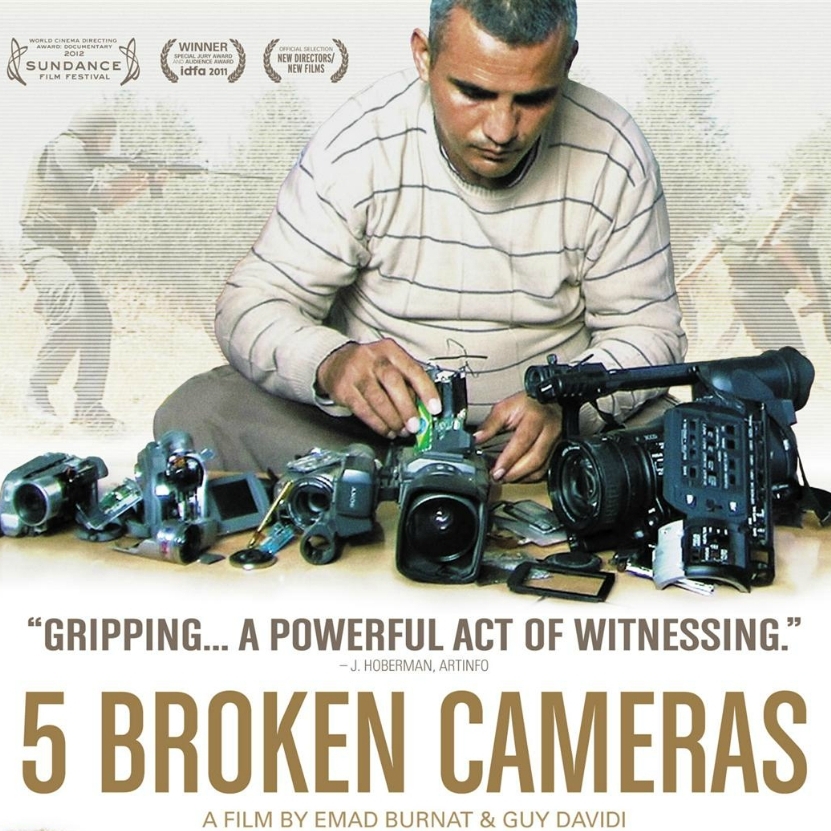Raw story, not flashy editing, is what makes the 2013 Oscar-nominated “5 Broken Cameras” (Best Documentary Feature) such a compelling film. Told in simple cinema verité style, “5 Broken Cameras” follows the viewfinder of one Emad Burnat, a peasant-stock Palestinian in the West Bank village of Bil’in. Acquiring a video camera to document the birth of his son Gibreel in 2005, Burnat finds himself witness to the growth of a nonviolent movement over the course of five years. Confronted with the confiscation of nearly half of the agrarian village’s land to an encroaching Israeli settlement and a security barrier, the village of Bil’in wages weekly nonviolent protests against the wall separating them from their land and faces heavy-handed repression from the occupying Israeli army. At times, Burnat’s camera protects him; at other times, it makes him a target, leaving him with the eponymous five broken cameras. Burnat’s footage is unflinching, at times harrowing and often poignant. The naked faces of oppression as well as hope and humanity are glimpsed in the gas grenade strewn streets and olive groves of Bil’in.
“5 Broken Cameras” was one of two films about Israel/Palestine vying for a Oscar among a formidable shortlist that included “The Invisibile War,” “How to Survive a Plague” and the winning film “Searching for Sugarman.” “The Gatekeepers,” the other Oscar contending documentary on Israel/Palestine, features a decidedly top-down approach interviewing elite former heads of Shin Bet, the Israeli secret police, who speak frankly for the first time, whereas“5 Broken Cameras” is decidedly grassroots and bottom up, taking the perspective of humble Palestinian West Bank villagers who decide on a path of nonviolent resistance despite the costs in the face of military occupation.
In war, the first casualty is truth. Burnat’s five broken cameras are testimony to that. “5 Broken Cameras” contains a seed of raw truth. A collaboration between Burnat and Israeli filmmaker Guy Davidi, “5 Broken Cameras” also points toward the way out of the Israeli-Palestinian impasse, a modern conflict that is often mistaken as an ancient one, showing the Israelis and internationals who join in solidarity with the villagers of Bil’in in nonviolent resistance. To cut through the misinformation on Israel/Palestine, many perspectives are needed: “5 Broken Cameras” is a good place to start.
Carolina Peace hosts a free screening of “5 Broken Cameras” Sunday Sept 15th at 3pm at Conundrum Music Hall located at 626 Meeting St in West Columbia, SC The film will be followed by talkback Q&A with David Matos, President of Carolina Peace, who traveled to Israel/Palestine in 2006 and 2009 with Interfaith Peacebuilders, and USC graduate Danya Nayfeh, who studied abroad in the West Bank in 2012. The film is screened as a collaboration with the award-winning PBS documentary series POV and can be streamed on PBS website through Sept 25th. Carolina Peace is planning additional screenings across the state.
LINKS:
PBS POV: http://www.pbs.org/pov/5brokencameras/
Oscar Nominees: http://oscar.go.com/nominees
Carolina Peace: http://www.carolinapeace.org
Facebook Event: https://www.facebook.com/events/695326850495245/

